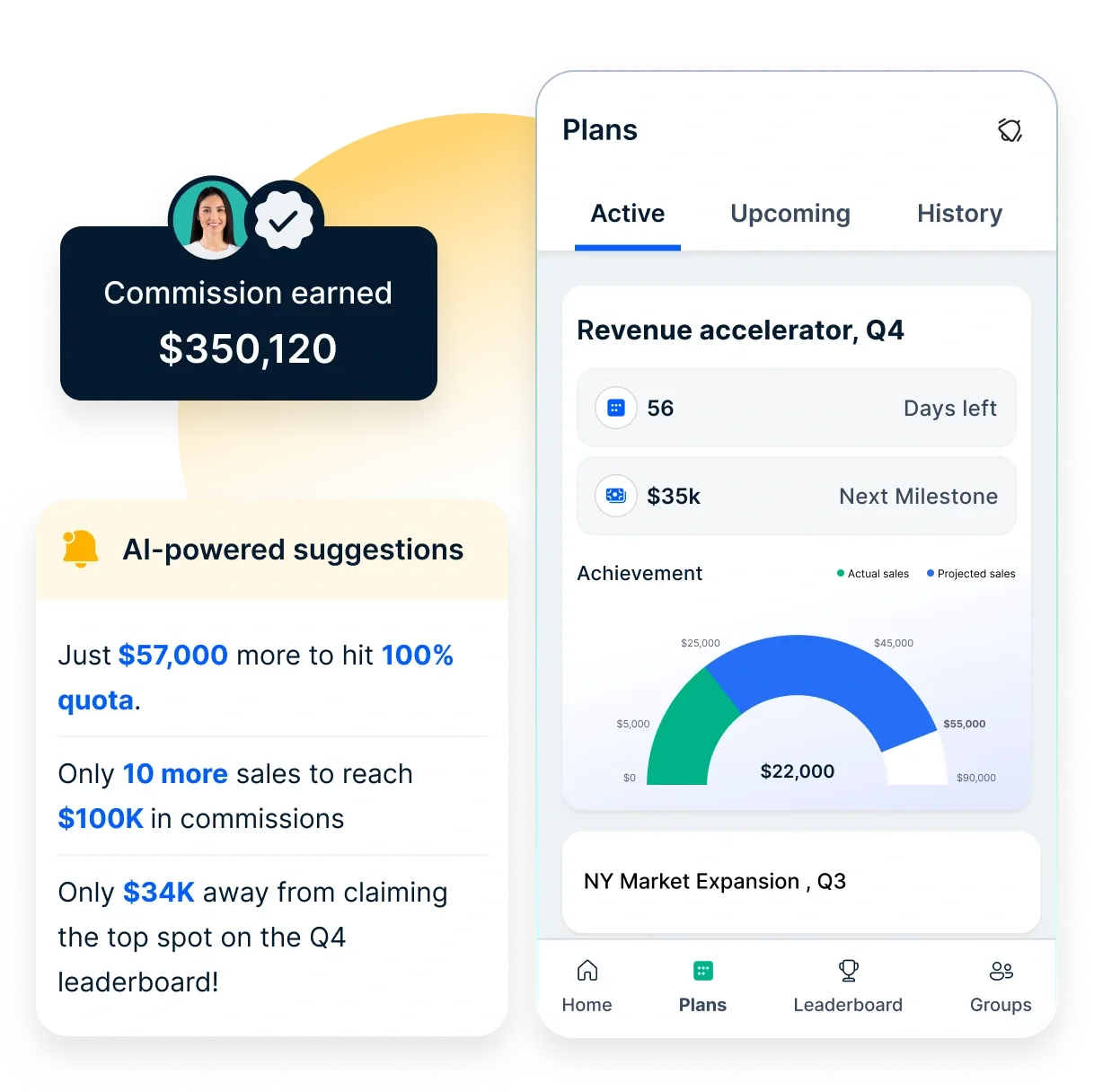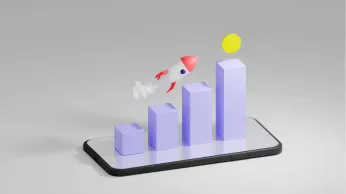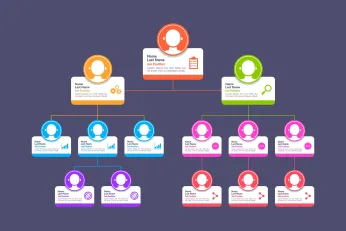Le 25 migliori frasi e domande di chiusura delle vendite per concludere l'affare nel 2025
Scoprite le migliori frasi e tecniche di chiusura delle vendite per concludere l'affare. Imparate strategie efficaci come le chiusure assuntive e d'urgenza per aumentare le conversioni nel 2025.
In questa pagina
SecondoSondaggio di HubSpotil 71% degli addetti alle vendite dichiara che la loro principale preoccupazione è quella di concludere più affari.
La chiusura delle vendite è la fase della procedura di vendita in cui il cliente o il potenziale cliente sceglie se acquistare un prodotto/servizio. Una frase di chiusura può essere l'ultima strategia che un rappresentante di vendita può utilizzare per convincere un cliente o un potenziale cliente ad acquistare il prodotto.
In generale esistono quattro tipi di frasi di chiusura delle vendite:
- Assuntivo:Quando il rappresentante di vendita effettua una chiusura assuntiva, usa la frase dando per scontato che la vendita sia conclusa. Ad esempio, "Quando devo venire a trovarvi per una demo gratuita del software"?
- Urgenza:Una frase di chiusura di vendita urgente implica una tempistica limitata. Ad esempio, "I nostri prezzi cambiano ogni giorno a seconda delle condizioni di mercato. Questo prezzo è solo per oggi".
- Opzione:Utilizzando una frase di chiusura con opzione, il rappresentante chiede al cliente di scegliere tra due opzioni. Ad esempio, "a seconda delle sue esigenze, ritiene che un abbonamento di un mese o di tre mesi sia ideale per lei"?
- Suggestivo: La frase di chiusura significa che il rappresentante suggerisce un prodotto in base alla conversazione con il cliente. Ad esempio, "sembra che il nostro pacchetto premier sia il più adatto a lei e alla sua attività. Lei è dello stesso parere?".
Perché è importante la frase di chiusura delle vendite?
La chiusura di una vendita è essenziale perché è quella parte della procedura di vendita in cui si sta per convincere il cliente ad accettare l'offerta. Per raggiungere questa fase, un rappresentante di vendita deve possedere abilità come l'ascolto attivo, la negoziazione e il superamento delle obiezioni per arrivare alla fase finale, in cui il cliente o la cliente alla fine dice sì.
Una buona chiusura aiuta a vincere la vendita. Indipendentemente dal vostro stile, è essenziale conoscere le fasi della chiusura di un affare. Vi preparerà ad affrontare ogni tipo di situazione: non esistono due clienti uguali e potreste dover provare diverse tecniche di chiusura con vari clienti.
Per scoprire quale tecnica è pertinente, è fondamentale conoscere le esigenze e gli interessi del cliente prima di effettuare la vendita. Identificare i punti dolenti è la chiave per vincere le vendite, eil 28% ha maggiori possibilità di chiudere la venditae di raggiungere la quota prefissata.
Per questo motivo, le frasi di chiusura di vendita efficaci sono pensate per garantire la conclusione dell'affare e portare a buon fine un processo di vendita prolungato.
Tecniche di chiusura delle vendite per il 2025
Esistono diversi approcci e tecniche associati alle frasi di chiusura delle vendite. Alcuni di essi sono riportati di seguito:
1. Chiusura rigida
La frase "chiusura difficile" comprende la vendita sotto pressione. È il caso in cui ci si presenta in anticipo per chiedere la vendita e si continua a chiedere in modo aggressivo anche prima di stabilire il valore del prodotto. In questo modo si dà l'impressione che si voglia solo raggiungere la propria quota.
L'hard closing può essere utilizzato solo se si è certi che il cliente procederà effettivamente con l'acquisto se si vede sfuggire di mano l'affare.
Ad esempio: "Temo che se non scegliete l'affare oggi, domani non sarà più disponibile".
2. Chiusura morbida
Il soft close è un approccio delicato per presentare i vantaggi di un prodotto e valutare l'interesse del potenziale cliente. Si tratta di presentare in modo neutrale i vantaggi e poi porre una domanda a bassa intensità per determinare la volontà di saperne di più.
Per esempio, "Se potessi dimostrare una riduzione della manutenzione dei widget del 25% e un aumento della produttività dei widget del 15%, sareste disposti ad approfondire?" oppure "Se condividessi con voi informazioni su come possiamo ridurre la manutenzione dei widget del 25% e aumentare la produttività dei widget del 15%, questo sarebbe in linea con gli obiettivi della vostra azienda?".
Questo metodo evita di avanzare richieste dirette e fornisce un modo non minaccioso per conoscere meglio le loro esigenze aziendali.
3. Chiusura presuntiva
La chiusura assuntiva è una potente strategia di vendita che sfrutta il principio della fiducia per garantire la vendita. Agendo come se l'affare fosse già concluso, i venditori creano un senso di certezza e promuovono una mentalità positiva.
Questo approccio prevede un'attenta osservazione delle reazioni e degli interessi del cliente e presuppone un esito positivo fin dall'inizio.
Per mettere in pratica la chiusura assuntiva, potreste porre domande del tipo: "Le sembra che questo sia qualcosa di cui la sua azienda avrebbe bisogno?". Dopo aver risposto ai requisiti del cliente, potreste procedere con affermazioni come "Quando possiamo iniziare, lunedì?" o "Quando ve lo consegneremo?".
Queste dichiarazioni presuppongono che il cliente sia pronto a procedere con la vendita, creando un senso di slancio e aumentando la probabilità di una chiusura positiva.
Come scrivere frasi di chiusura di vendita efficaci: Suggerimenti e trucchi
1. Fare una ricerca adeguata
Comprendere l'offerta della vostra azienda e la natura dell'attività del vostro potenziale cliente per presentargli le soluzioni più adatte a lui. Pertanto, condurre una ricerca approfondita è essenziale durante tutto il processo di vendita.
Discutetene con il vostro referente e con gli altri membri del team interessati nei diversi dipartimenti dell'azienda, per conoscerli a fondo. In questo modo avrete un quadro migliore del funzionamento dell'azienda del potenziale cliente e delle sue esigenze e preferenze.L'84% degli acquirentisono propensi ad acquistare da un'azienda che comprende i loro obiettivi.
2. Segnare le aspettative
Ricordate che non tutte le opportunità vengono chiuse. Per questo motivo, è essenziale stabilire aspettative realistiche. Prima di offrire una dimostrazione o una prova del prodotto, ponete al vostro interlocutore domande sul suo budget, sui suoi obiettivi e sulle sue tempistiche.
Una volta che il loro obiettivo e il loro budget sono in linea con il vostro prodotto, potete costruire un buon rapporto con loro e guadagnarvi la loro fiducia. Ricordate che settori diversi hanno percentuali di chiusura diverse. Alcuni di essi,a seconda del settoresono:
- Finanze: 19%
- Computer: 23%
- Aziende commerciali e industriali: 27%.
3. Condividere una storia
D'accordo o no,narrazioneè il modo migliore per impressionare i clienti. Le persone ricordano le storie più di qualsiasi informazione.
Come rappresentanti di vendita, avete un tempo specifico per dare un'impressione nella fase di chiusura della vendita. Assicuratevi di usarlo con saggezza.
Inoltre, non inventate storie irrilevanti che i clienti possano facilmente intuire. Il 90% delle decisioni si basa sulle emozioni e non sulla logica. Per questo motivo, una storia è un modo eccellente per attingere alle emozioni.
- Storie vere e di successo: Raccontate la storia di un cliente che ha beneficiato del vostro servizio. Raccontate come il vostro prodotto sia stato utile alla loro azienda.
- Testimonianza personale: Se un potenziale cliente si mostra preoccupato per la reputazione dell'azienda, la competenza del prodotto o l'assistenza 24 ore su 24, fornite una testimonianza personale per rassicurarlo che sarà nelle mani giuste.
4. Presentare i vantaggi anziché il prodotto
Avete mai sentito dire che "le persone non vogliono acquistare un trapano da mezzo pollice, ma desiderano un trapano da mezzo pollice"? Tenetelo a mente quando lavorate con un potenziale cliente.
Concentratevi sui vantaggi del prodotto. Ricordate che il lead non sta pensando di acquistare ciò che vendete, ma desidera risolvere un problema che sta affrontando. Quindi, che si tratti di convenienza, qualità o altro, è necessario commercializzare i vantaggi.
Vi aiuterà ulteriormente a combattere un fornitore a basso costo, che è una sfida significativa da vincere.sfida da superarein questo campo.
5. Gestire le obiezioni
Se un potenziale cliente solleva un dubbio sul vostro prodotto,affrontatelo in modo proattivo. Ascoltateli e rispondete alle loro obiezioni. Chiarite tutti i loro dubbi e assicuratevi di rispondere in modo ponderato.
6. Far avanzare l'affare
Non appena siete sicuri che la soluzione è adatta all'acquirente, chiedete la vendita. Assicuratevi che l'acquirente si senta a proprio agio, ma comunicate tutte le urgenze possibili per portare avanti l'affare.
25 esempi di frasi di chiusura delle vendite in azione
Fare una chiusura in azione è difficile. Bisogna lavorare bene sulla frase, in modo da non sembrare troppo aggressivi nell'approccio. Non si vuole creare uno stress indesiderato per il lead.
Ecco alcuni esempi di frasi di chiusura di vendita in azione per aiutarvi a concludere l'affare:
1. Quando volete iniziare l'implementazione?
Come molte frasi d'azione, anche questa è interamente in azione, in quanto il potenziale cliente passerà immediatamente all'azione e potrà rispondere entro un determinato periodo di tempo. Tuttavia, assicuratevi di non usarla troppo presto, o potrebbe erodere la loro fiducia.
2. Quando devo consegnarlo?
Si tratta di un'altra frase d'azione ben calibrata che vi aiuterà a ottenere la conferma della vendita. Tuttavia, se il potenziale cliente ha delle domande da porre, rispondete tranquillamente prima di proporre questa frase di chiusura.
3. Vuoi scegliere A o B?
Questa potrebbe essere una domanda migliore per la vendita di azioni: aiuta a misurare l'impegno che stanno per prendere. In una buona situazione, quando glielo chiedete chiuderanno immediatamente. Se non hanno ancora deciso, avrete dei numeri concreti.
4. Inviatemi i vostri dati in modo che possa procedere con le pratiche burocratiche.
Se il potenziale cliente è pronto ad acquistare, vi fornirà queste informazioni. Se invece non sono pronti, si troveranno in una posizione un po' scomoda, spiegando perché non possono fornirvi le informazioni.
5. A chi sarà intestata la fattura?
Si tratta di una frase di chiusura più morbida rispetto a quelle precedenti e che si sposa bene con il potenziale cliente.
6. Se offriamo il prodotto a un prezzo particolare, fareste affari con noi?
È un trucco. Una volta che il cliente risponde di sì, il rappresentante può soddisfare le sue obiezioni senza problemi.
7. Se riuscissimo a risolvere le sue obiezioni, firmerebbe l'accordo?
I dubbi uccidono gli accordi. Per questo motivo, è importante dare ai clienti l'impegno che l'azienda possa risolvere il loro problema entro i tempi suggeriti.
8. Il prodotto sembra essere perfetto per la vostra azienda. Lo pensate anche voi?
La domanda induce il potenziale cliente a riflettere sulle ragioni che lo spingono ad acquistare il vostro prodotto. Inoltre, appare genuina invece di essere un'esortazione.
9. Perché non provate?
È una domanda piuttosto semplice. Invece di prendere un impegno, potete semplicemente permettere al potenziale cliente di dare una possibilità al vostro prodotto.
10. Prendereste in considerazione l'idea di fare affari con noi?
Una domanda diretta. È la migliore tecnica di chiusura che dimostra la ferma padronanza del venditore sulla situazione.
11. Sono pronto a procedere? Devo ottenere il contratto?
È come progredire. Se il potenziale cliente è soddisfatto della vostra presentazione, firmerà volentieri il contratto.
12. Trovate interessanti le caratteristiche A e B. Iniziando oggi, arriverete alla data giusta.
Ricorda al potenziale cliente che quanto prima prenderà una decisione, avrà una nuova soluzione al suo fianco.
13. Sarebbe una buona raccomandazione per il prossimo trimestre? Se sì, potrei seguirla.
Se il venditore ritiene che il potenziale cliente voglia insistere sull'affare per un po' di tempo. Allora questa è la chiusura perfetta.
14. È abbastanza soddisfatto da firmare il contratto oggi?
Una volta incontrate tutte le obiezioni, il venditore può metterle in discussione.
15. Ho fatto abbastanza per guadagnarmi la vostra fiducia?
Si tratta di una domanda umile, alla quale il potenziale cliente risponderà affermativamente se le sue obiezioni verranno affrontate.
16. Qual è il modo migliore per iniziare?
Una domanda semplice e aperta che spinga il potenziale cliente ad andare avanti e che dimostri che siete pronti ad agire.
17. Vuole che riveda il contratto con lei un'ultima volta?
Questa frase di chiusura offre al potenziale cliente l'opportunità di porre qualsiasi altra domanda, dimostrando la vostra volontà di chiarire prima di concludere.
18. In che modo la nostra soluzione si adatta ai vostri obiettivi attuali?
Un esempio di chiusura assuntiva che incoraggia il potenziale cliente a valutare quanto il prodotto sia in linea con i suoi obiettivi. Questo li spinge a prendere una decisione favorevole.
19. C'è qualcos'altro che posso fornirle per aiutarla ad andare avanti?
Un approccio incentrato sul cliente che dimostri la disponibilità a risolvere eventuali dubbi dell'ultimo minuto prima di concludere la vendita.
20. Quando sarebbe il momento giusto per definire i dettagli?
Questa formulazione dà al potenziale cliente un certo controllo, indicando chiaramente che il passo successivo è la chiusura dell'affare.
21. Se potessi ottenere l'approvazione del mio team, sareste pronti a procedere?
Questa è una buona tecnica se la decisione coinvolge altre parti interessate. Inquadra la decisione come imminente una volta ottenuta l'approvazione interna.
22. Entro quanto tempo posso inviarvi il contratto?
Una frase che si concentra sulle fasi amministrative successive, segnalando che l'accordo è quasi finalizzato e pronto per le pratiche burocratiche.
23. Si sente sicuro di andare avanti?
Questa frase di chiusura è un modo sottile per verificare il livello di impegno e di disponibilità del potenziale cliente. Dimostra che siete pronti, ma volete assicurarvi che il cliente sia d'accordo.
24. Se riuscissimo a risolvere [problema specifico], sarebbe pronto a firmare?
Adattata alle obiezioni specifiche del potenziale cliente, questa frase di chiusura dimostra che siete attenti alle sue esigenze e disposti a lavorare con lui per trovare una soluzione.
25. Cominciamo subito: devo redigere l'accordo?
Una frase di chiusura forte e orientata all'azione che presuppone che la vendita sia già stata fatta, offrendo al potenziale cliente la spinta finale per impegnarsi.
Non solo frasi, crediamo che le domande di chiusura possano aiutarvi a concludere un affare.
25 domande di chiusura delle vendite
Potete utilizzare una qualsiasi delle decine di domande per concludere qualsiasi affare. Assicuratevi che siano pertinenti alla vostra situazione e che i tempi siano adeguati. Le domande di chiusura anticipate possono allontanare i potenziali acquirenti. Se rimandate troppo a lungo le domande conclusive, potete sprecare un'occasione.
Tuttavia, se si adottano le misure di cui sopra, si è pronti a chiedere qualsiasi domanda di chiusura elencata di seguito.
1. Riuscite a capire come il nostro prodotto/servizio possa soddisfare le vostre esigenze specifiche?
2. Avete dubbi o riserve che non abbiamo ancora affrontato?
3. Quale pensate sia il passo successivo nel processo di acquisto?
4. Quando vorreste iniziare?
5. Ci sono altri decisori coinvolti nel processo di acquisto?
6. Qual è il budget che avete stanziato per questo acquisto?
7. Avete altre proposte concorrenti sul tavolo?
8. Che cosa vi impedisce di prendere una decisione in questo momento?
9. Vi viene in mente qualche motivo per cui questa soluzione non andrebbe bene per voi?
10. Volete che vi spieghi i passi necessari per iniziare?
11. Quali sono le tre caratteristiche o i vantaggi più interessanti del nostro prodotto/servizio?
12. Cosa vi serve per essere sicuri di procedere con questo acquisto?
13. Ha dei dubbi sulla reputazione della nostra azienda o sulla qualità del nostro prodotto/servizio?
14. Cosa succederebbe se non decideste di procedere con la nostra soluzione?
15. C'è qualcos'altro che le serve per aiutarla a prendere una decisione?
16. Quali sono le conseguenze della mancata soluzione di questo problema per la vostra azienda?
17. Le viene in mente qualcun altro nella sua organizzazione che potrebbe beneficiare della nostra soluzione?
18. Qual è la tempistica che avete in mente per implementare questa soluzione?
19. Vi sentite a vostro agio con l'investimento necessario per ottenere i risultati che cercate?
20. Quali vantaggi avrebbe la vostra azienda se fossimo in grado di risolvere questo problema per voi?
21. Quali informazioni aggiuntive posso fornire per aiutarla a prendere una decisione?
22. Come si colloca la nostra soluzione rispetto a quella che utilizzate attualmente?
23. Cosa la farebbe sentire a suo agio nel firmare l'accordo oggi?
24. Se potessimo offrire una soluzione a [sfida specifica], la decisione sarebbe più facile per lei?
25. C'è un motivo per cui non vorreste fare il prossimo passo con noi oggi?
Queste domande di chiusura delle vendite possono aiutarvi a identificare eventuali obiezioni o preoccupazioni del potenziale cliente e a risolverle. Possono anche aiutarvi a portare il potenziale cliente verso una decisione finale, a superare eventuali ostacoli alla vendita e a chiudere l'affare. È importante utilizzare queste domande in modo colloquiale e naturale, in modo da adattarle al tono e al flusso della conversazione di vendita.
Suggerimenti per le transazioni postali
Ecco alcuni consigli da seguire dopo la chiusura dell'affare:
- Registrate l'affare nel vostro software:credeteci, il vostro responsabile delle vendite ve ne sarà grato. La registrazione dell'affare terrà aggiornato il vostro team.
- Offrite un'introduzione al seguente reparto:La chiusura dell'affare è una parte del viaggio del cliente verso la vostra azienda. Il cliente è stato accolto. Assicuratevi di presentarli al reparto successivo per una transizione senza intoppi.
- Seguiteli:Verificate se il vostro cliente è soddisfatto del suo acquisto. Questo vi aiuterà a conquistare la loro fiducia e la loro fedeltà. In caso di problemi, assicuratevi di risolverli immediatamente.
Accentuare gli effetti della chiusura degli affari con Compass
Compass potrebbe svolgere un ruolo significativo nell'accentuare il processo di chiusura delle vendite. Ecco come può contribuire:

Gamification: Compass fornisce elementi di gamification che possono stimolare una sana competizione tra i team di vendita. Ad esempio, la creazione di premi per i rappresentanti che chiudono il maggior numero di accordi o che spostano un prospect più lontano nell'imbuto di vendita può essere un efficace motivatore.
Premi e riconoscimenti per le pietre miliari: È possibile impostare delle pietre miliari in Compass (ad esempio, completare un certo numero di chiusure di successo o ottenere un feedback positivo dai clienti). Questi traguardi possono essere collegati a premi e riconoscimenti, per mantenere i rappresentanti di vendita concentrati sul raggiungimento e sul superamento dei loro obiettivi di vendita.
Incentivi personalizzati: Compass consente di creare programmi di incentivi personalizzati che possono essere mirati a comportamenti specifici, come la chiusura più rapida degli affari o il superamento di obiezioni difficili. Gli incentivi personalizzati potrebbero essere ciò di cui i rappresentanti hanno bisogno per superare le obiezioni e chiudere con fiducia gli affari.
Integrando Compass nel vostro processo di chiusura delle vendite, creerete un ambiente più coinvolgente e orientato alle prestazioni, che motiverà il vostro team, aiuterà a monitorare i progressi e garantirà la chiusura delle trattative. Programmate una chiamata ora!
Conclusione
La chiusura di una vendita è l'obiettivo finale di qualsiasi proposta di vendita e il modo in cui si pongono le domande di chiusura può fare la differenza. Esistono diverse tecniche di chiusura delle vendite, come la chiusura assuntiva, la chiusura di prova, la chiusura d'urgenza e la chiusura a scelta, o domande di chiusura per l'assertività. Scegliete quella che si adatta meglio alla situazione e al potenziale cliente.
Con le giuste frasi di chiusura delle vendite e le domande giuste, potete aumentare le vendite e far crescere la vostra attività. Utilizzate quindi queste domande come punto di partenza, adattatele alla vostra situazione specifica e scoprite come possono aiutarvi a concludere più affari e a raggiungere i vostri obiettivi di vendita.
Domande frequenti
1. Che cos'è una chiusura assuntiva?
La chiusura assuntiva è una tecnica di vendita in cui il venditore presume che l'acquirente sia pronto ad acquistare e porta avanti la conversazione ponendo domande che implicano un accordo, come ad esempio: "Vuole che organizzi la consegna lunedì?". Questo metodo aiuta a mantenere lo slancio e la fiducia nel processo di vendita.
2. Come si chiude una frase di vendita?
Per chiudere efficacemente una vendita, utilizzate frasi che presuppongono l'accordo dell'acquirente. Ad esempio, invece di chiedere se vuole procedere, si potrebbe dire: "Quando vuole che venga consegnato?". Questo approccio guida il cliente verso la conclusione della transazione senza chiedere direttamente il suo impegno.
3. Qual è la migliore frase di chiusura?
La migliore frase di chiusura dipende spesso dal contesto, ma un esempio forte è: "Cominciamo oggi; quando vuole iniziare?". Questa frase presuppone la disponibilità e incoraggia l'azione immediata.
4. Come si chiudono i preventivi di vendita?
Per chiudere i preventivi di vendita, potete usare frasi che rafforzino il valore della vostra offerta e che spingano all'azione. Per esempio, dire: "Oggi stesso le invierò il contratto per la revisione; le va bene?" aiuta a facilitare le fasi successive del processo.
5. Come chiudere le vendite come un professionista?
Chiudere le vendite in modo efficace:
- Comprendere le esigenze del cliente: Ascoltare attivamente e rispondere alle preoccupazioni.
- Utilizzare tecniche di chiusura assuntive: Formulare domande che implichino un accordo.
- Creare urgenza: Evidenziate la disponibilità limitata o le offerte sensibili al tempo.
- Seguire con fiducia: Rafforzate la vostra convinzione del valore del vostro prodotto o servizio.
6. Qual è un esempio di domanda chiusa nelle vendite?
Una domanda chiusa nelle vendite potrebbe essere: "Vuole procedere con questo ordine?". Questa domanda richiede una semplice risposta "sì" o "no" e aiuta a valutare la disponibilità dell'acquirente a impegnarsi.
7. Che cos'è una domanda di chiusura nelle vendite?
Una domanda conclusiva ha lo scopo di suscitare una decisione da parte del cliente. Esempi sono: "È pronto a procedere con l'acquisto?" o "Posso fissare la consegna per la prossima settimana?". Queste domande mirano a concludere la vendita.
8. Quali sono le 5 W delle vendite?
Le 5 domande W nelle vendite si riferiscono tipicamente a:
- Chi - Chi è il decisore?
- Cosa - Quali sono le loro esigenze specifiche?
- Dove - Dove verrà utilizzato il prodotto?
- Quando - Quando ne hanno bisogno?
- Perché - Perché stanno considerando questo acquisto?
9. Qual è una buona domanda aperta per le vendite?
Una buona domanda aperta per le vendite potrebbe essere: "Quali sono le sfide che state affrontando attualmente e che possiamo aiutarvi a risolvere?". Questo incoraggia il dialogo e permette al venditore di comprendere meglio le esigenze del cliente.













